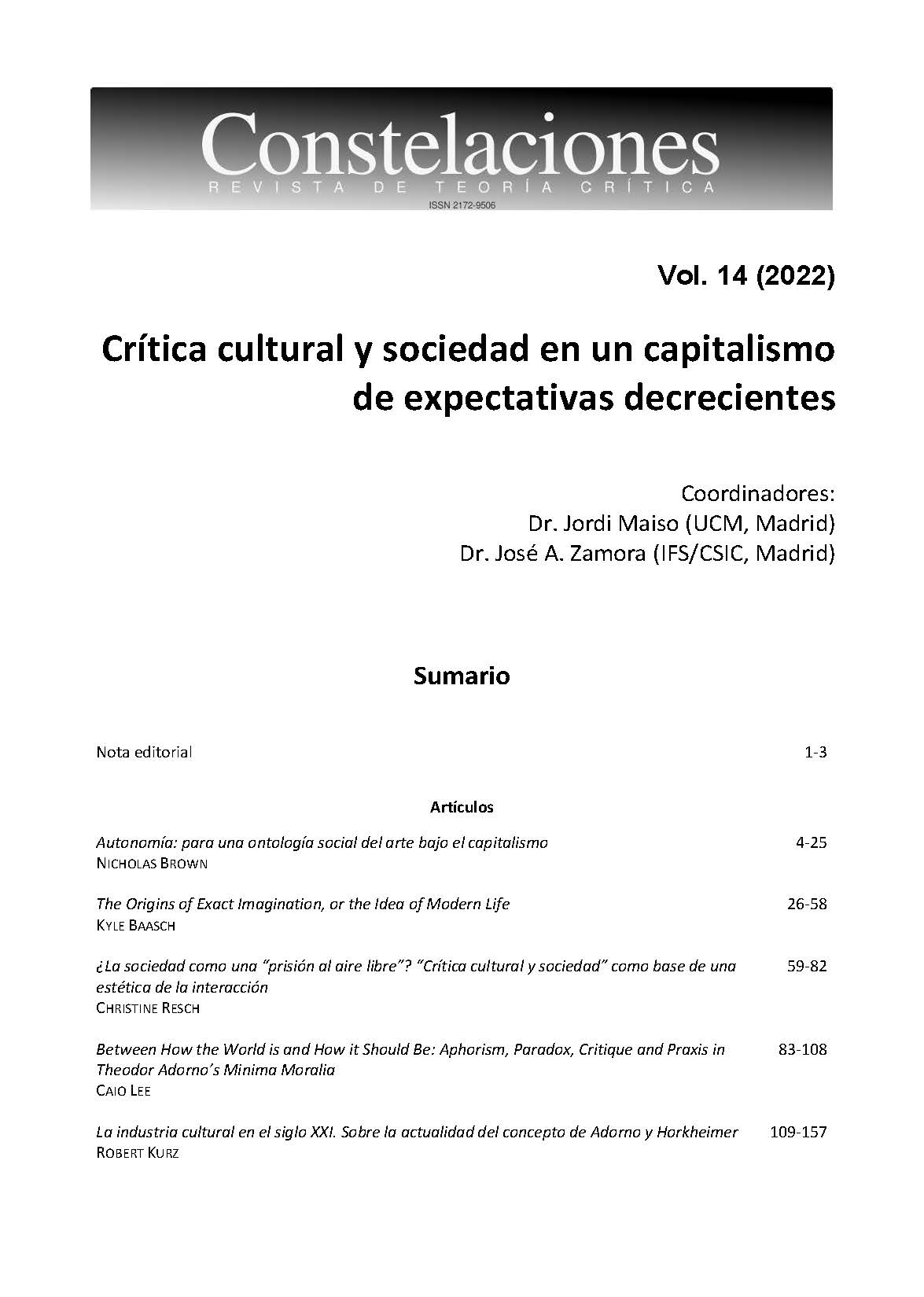Repressive Democracy
Palavras-chave:
Democracia represiva - Democracia capitalista - Manipulación ideológica - Economía represiva - Herbert Marcuse - Theodor Adorno, Repressive Democracy - Capitalist Democracy - Ideological Manipulation - Repressive Economy - Herbert Marcuse - Theodor AdornoResumo
Resumen
En la democracia imperante en la sociedad capitalista contemporánea se desarrolla una violencia estructural interna que diariamente reproduce la represión y normaliza la violencia en todas las dimensiones de la vida social. Esto genera estructuras de poder autoritarias e incluso neofascistas a nivel social y político. Este marco define lo que se denomina “democracia represiva”. La persistencia de estas condiciones objetivas para el desarrollo del autoritarismo es explicada por Adorno -en Aspectos de lo Nuevo Extremismo de Derecha- a partir de las formas de manipular y engañar a las masas mantenidas en la democracia actual aún con el fin del fascismo. Para Marcuse – en El Destino Histórico de la Democracia Burguesa – se trata de la represión autonomizada a partir de la imposición permanente en la vida social y política de la democracia actual por parte del orden económico de acumulación capitalista, generando concentración del capital con desigualdad y exclusión de la población. Para Adorno, la superación de este autoritarismo de extrema derecha pasa sobre todo por una educación democrática dirigida a la generación de sujetos emancipados por la autonomía. Según Marcuse, la superación del autoritarismo totalitario implica acciones políticas prácticas para democratizar la democracia represiva por parte de todos aquellos sometidos a la dominación a través de la acumulación de capital. Es un proceso de liberación sustentado en nuevas experiencias no represivas, presentes tendencialmente aunque obstruidas, en la relación entre la organización social y política y el proceso de reproducción económico-capitalista.
Abstract
An internal structural development in the prevailing democracy of contemporary capitalist society reproduces repression and normalizes violence in all dimensions of social life, generating authoritarian and even neo-fascist power structures on the social and political level. This framework defines what is called “repressive democracy”. The persistence of these objective conditions for the development of authoritarianism is explained by Adorno - as in Aspects of the New Right-Wing Extremism - as the ways of manipulating and deceiving the masses maintained in current democracy even with the end of fascism. For Marcuse – as in The Historical Fate of Bourgeois Democracy – it is about the autonomy of the repression with the permanent imposition on the social and political life of the current democracy by the economic order of capitalist accumulation, generating capital concentration with inequality and population exclusion. For Adorno, overcoming this extreme right-wing authoritarianism demands a democratic education aimed at the generation of subjects emancipated by autonomy. According to Marcuse, overcoming totalitarian authoritarianism involves practical political actions to democratize repressive democracy on the part of all those subjected to domination through capital accumulation. It is a process of liberation supported by new non-repressive experiences, tending to be present, although obstructed, in the relationship between social and political organization and the process of economic-capitalist reproduction.
Downloads
Referências
ADORNO, Theodor. W. (2005): “The Meaning of Working through the Past”, in ADORNO, Theodor W. (2005): Critical Models – Interventions and Catchwords. New York: Columbia University Pres, 89-104.
ADORNO, Theodor W. (2020): Aspects of the New Right-Wing Extremism. Cambridge: Polity
BADIOU, Alain (2020): Trump. Paris: PUF
BROWN, Wendy (2009): “Nous sommes tous démocrats à present”, in AGAMBEN, Giorgio et al. (2009): Démocratie, dans quel état? Paris: La fabrique, 59-75.
KOSELLECK, Reinhart (2004): Futures Past. New York: Columbia University Press.
MARCUSE, Herbert (1968): “The Struggle against Liberalism in the Totalitarian View of the State”, in MARCUSE, Herbert (1968) – Negations. London: Penguin, 3-42
MARCUSE, Herbert (1971): “Nachwort”, in BENJAMIN, Walter (1971): Zur Kritik der Gewalt und andere Aufsätze. Frankfurt am Main: Suhrkamp, 97-107.
MARCUSE, Herbert (1991): One-Dimensional Man. Boston: Beacon Press.
MARCUSE, Herbert (2001): “The Historical Fate of Bourgeois Democracy”, in MARCUSE, Herbert (2001): Towards a Critical Theory of Society. London: Routledge: 163-186.
MARCUSE, Herbert (2007): “Repressive Tolerance”, in MARCUSE, Herbert (2007): The essential Marcuse. Boston: Beacon Press, 32-59.
NEGT, Oskar (1999): “Marcuses dialektisches Verständnis von Demokratie”, in MARCUSE, Herbert (1999): Nachgelassene Schriften – Band 1: Das Schicksal der bürgerlichen Demokratie. Lüneburg: zu Klampen, 12-25.
RANCIÈRE, Jacques (2009): “Les démocraties contre la démocratie”, in AGAMBEN, Giorgio et al. (2009): Démocratie, dans quel état? Paris: La fabrique, 95-100.
RIMBAUD, Arthur (1964): “Démocratie”, in Oeuvres Poétiques. Paris: Garnier Flammarion.
Downloads
Publicado
Como Citar
Edição
Secção
Licença
Direitos de Autor (c) 2022 Wolfgang Leo Maar

Este trabalho encontra-se publicado com a Licença Internacional Creative Commons Atribuição-NãoComercial-CompartilhaIgual 4.0.
Aquellos autores/as que tengan publicaciones con esta revista, aceptan los términos siguientes:
1. Los autores/as conservarán sus derechos de autor y garantizarán a la revista el derecho de primera publicación de su obra, el cuál estará simultáneamente sujeto a la Licencia de reconocimiento de Creative Commons que permite a terceros compartir la obra siempre que se indique su autor y su primera publicación esta revista.
2. Los autores/as podrán adoptar otros acuerdos de licencia no exclusiva de distribución de la versión de la obra publicada (p. ej.: depositarla en un archivo telemático institucional o publicarla en un volumen monográfico) siempre que se indique la publicación inicial en esta revista.
3. Se permite y recomienda a los autores/as difundir su obra a través de Internet (p. ej.: en archivos telemáticos institucionales o en su página web) antes y durante el proceso de envío, lo cual puede producir intercambios interesantes y aumentar las citas de la obra publicada. (Véase El efecto del acceso abierto).
Confidencialidad de los datos
1. Constelaciones. Revista de Teoría Crítica garantiza que los datos que nos envíe serán utilizados únicamente para atender sus demandas manifestadas en este mensaje.
2. Sus datos no serán cedidos a terceros.
3. Cuando lo desee puede solicitar que sus datos sean eliminados de nuestros registros.





